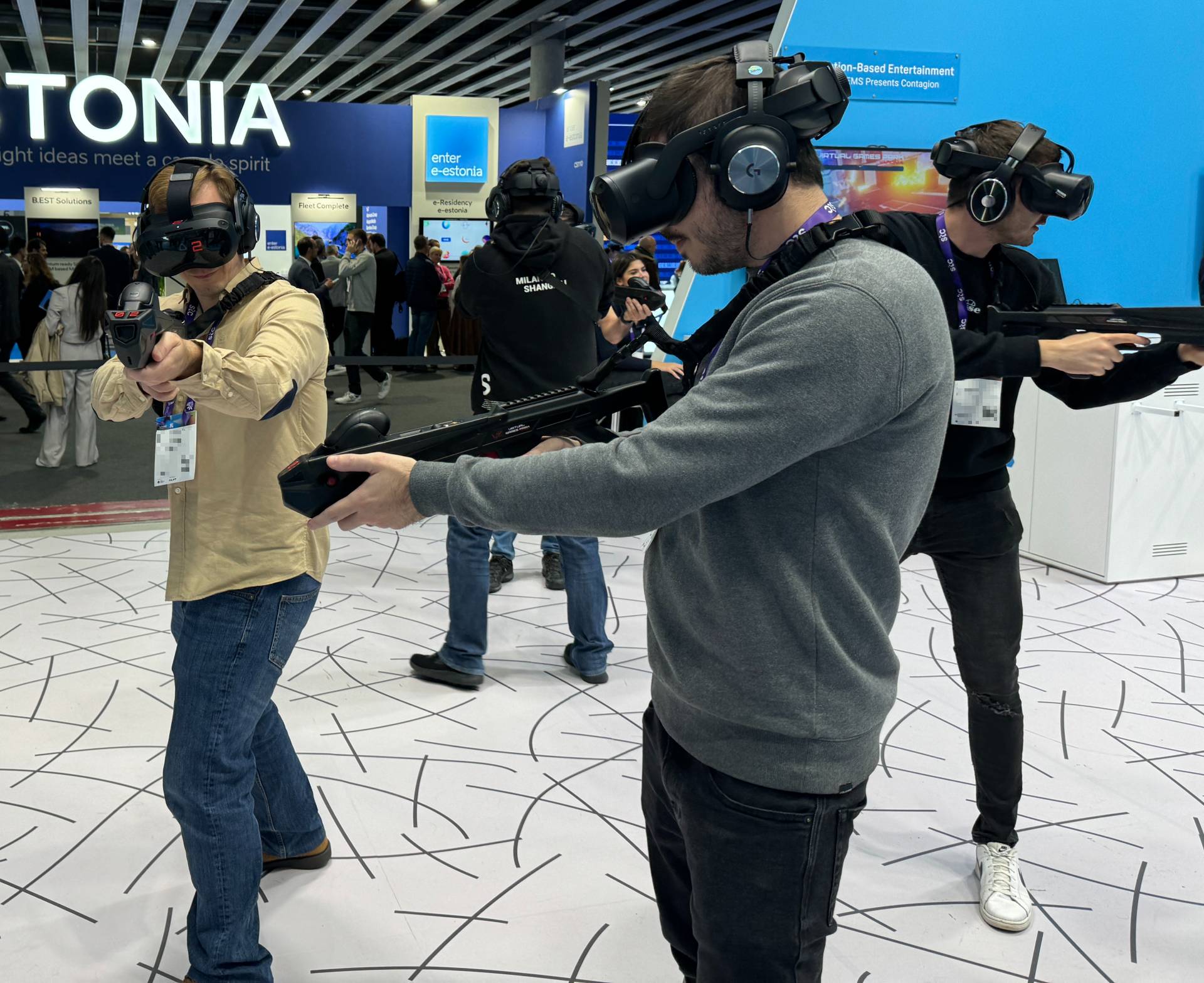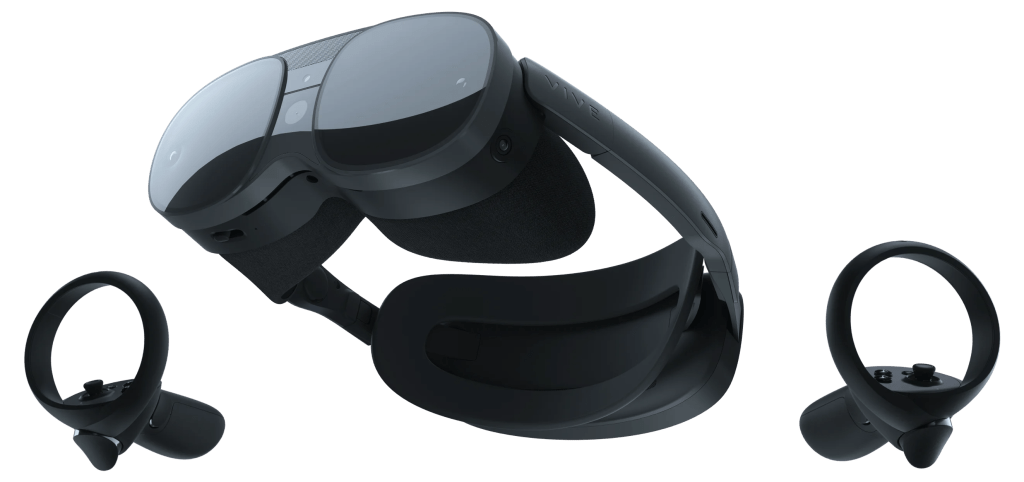A lot has changed at HTC in the decade since a small team broke off to form its mixed reality division. In fact, it’s a fundamentally different business in several meaningful ways. For one thing, you can’t call HTC a phone company any longer. Contrary to popular perception, the Taiwanese corporation does still produce handsets — primarily mid-range devices for the Asia market.
These days, the mixed reality business comprises the “vast majority” of HTC’s global business, says Dan O’Brien. We sat down with the Vive general manager at MWC earlier this week, alongside John Dabill, the brand’s head of Product Operations. Much like last year, HTC has gone big with the booth. It’s big and white, with several demo stations scattered throughout.
To get to the conference rooms in the rear, you have to walk between the dancing woman and the group of a half-dozen men aiming plastic guns in all directions. Beyond this, a few representatives from third parties are talking up their own wares, including Nord Space ApS, which helped customize an HTC headset for Danish ISS crew member Andreas Mogensen. The startup’s CTO notes that gravity plays a role in many systems’ tracking capabilities. It’s one of a number of things that need to be addressed before spending the tens of thousands of dollars per kilo to send it up.
It’s perhaps telling that the two front-facing demos are entertainment based. Certainly, watching someone playing a weird dance game does a lot more to pull in conference window shoppers than, say, an enterprise training app. Ultimately, however, the consumer business has shrunk dramatically relative to its enterprise offerings.
“We were 50/50,” says O’Brien, “but now we’re indexing closer to 70% [enterprise].” The executive notes that the seeds for a shift to enterprise were planted close to the beginning of Vive’s existence. In 2015, HTC sent 27,000 headsets to developers in a bid to bolster the Vive ecosystem. Around 30% of that figure went to enterprise devs. The company was ahead of the curve in this respect, internalizing a lesson that Magic Leap would learn the hard way, years later.
“[Magic Leap was] confused about what the market could really bear,” says O’Brien. “They started off so heavy with consumer and spent $10 million on a content deal. It launched with like 12 pieces of content for a $3,000 headset. It didn’t solve any problems. It was just an entertainment thing. You’re fighting over leisure time. That’s a really hard battle. You’ve got Xbox and PlayStation, your phone — you’re fighting over that time people have to entertain themselves, and I think they quickly figured and shifted everything to enterprise. But even then, that’s a real struggling business.”
HTC’s initial focus on gaming was in part born out of its early partnership with Valve. When the Vive team first came together, it began working on augmented reality prototypes. Steam’s parent company also played a key role in the company’s shift to VR.
“When we met with Valve, we were like, ‘hey, we can partner, because you guys know content and developers,’” says O’Brien. “That wasn’t a core competency of HTC in 2014. We were a smartphone company. We thought we could create something special and come together here. So, we put together an agreement and started working together.”
Gaming continues to be the key application on the consumer side, though the division is a drop in the bucket compared to enterprise — a gulf that will likely only continue to widen. In recent years, HTC hasn’t been in the headset conversation for most prospective buyers. Meta currently dominates the space, while Apple has more recently grabbed the spotlight with the Vision Pro (whether the $3,500 AVP can truly be considered a consumer device, however, is another question altogether).

Meta, in particular, has sucked a lot of air out of the room. “I think Meta has adjusted the market perception of what this technology should cost,” says O’Brien. “Losing $12 billion a year on a business sure doesn’t feel like success. In 2021, Mark Zuckerberg confirmed that Meta was losing money on its Quest headsets, noting, “We plan to continue to either subsidize our devices or sell them at cost to make them available to more people.”
That’s a game you can play when you have of a massive ad business propping up your mixed reality play. For the time being, at least, Meta can continue losing money on its headsets and will do so as long as flooding the market with devices is foundational to its broader metaverse play. HTC is now an extended reality company, first and foremost. Its revenue comes from the headsets, not in spite of them.
The company did, however, recognize the shortcomings of the consumer market early enough to get a significant head start over the likes of Magic Leap.
Training continues to be far and away the primary applications on the enterprise side. Purchasing headsets in bulk is a big upfront cost, but certain companies can see savings in the long run. There’s a broad range of categories that could see potential benefits, including aerospace and healthcare. Fittingly, the company has received FDA certification for two of its headsets and FAA clearance on one.
In recent years, Vive has expanded from a VR focus to mixed reality, utilizing passthrough technology similar to the kind found on the Vision Pro. It’s a move that also draws upon augmented reality, the category the company abandoned early on. O’Brien insists that this combination of technology is the only way forward for the industry.
“I’ve been really clear with the Magic Leap team and anybody else who asks that the future of wearables is a headset that can do VR, can do mixed reality, can do AR,” he explains. “This whole argument of who’s going to win, AR or VR, it’s built on the same technology progressing, but you’re going to make that silly argument. We’re starting to see mixed reality applications, where people can collaborate over a design in a physical space with a digital overlay of an object. This is just the beginning of mixed reality.”
Meta has impacted the industry in another key way. When you picture the metaverse, what does it look like? There’s a good chance it’s an AI chat. Facebook has made the two inseparable for most people. But HTC’s definition of the term is far broader, amounting to any virtual space where people with headsets or other hardware connect.
O’Brien cites a meeting with Wells Fargo as an example of metaverse applications on the enterprise side. “They were like, ‘we just fly 380 people to a town hall in Charlotte.’ We were like, ‘yeah, you can use one of these Mars Camtracks and instead of 300, you have 300,000 people. You could have invited everybody and paid a couple thousand dollars per person.”
Like the rest of the world, HTC is currently exploring how generative AI might be integrated into its ecosystem.
“I think it’s a given,” says Dabill. “It’s already helping with 2D images and video very quickly. We’re not there yet, but we definitely see that helping to develop the virtual reality space. You don’t need the artistic and technical skills, you can simply talk to the AI and have it generate the space.”
Such functionality is believed to be coming in the very near future. It will likely have a dramatic impact on virtual reality’s ability to generate virtual environments, including the ability to create infinite scenery on the fly.
































Comment